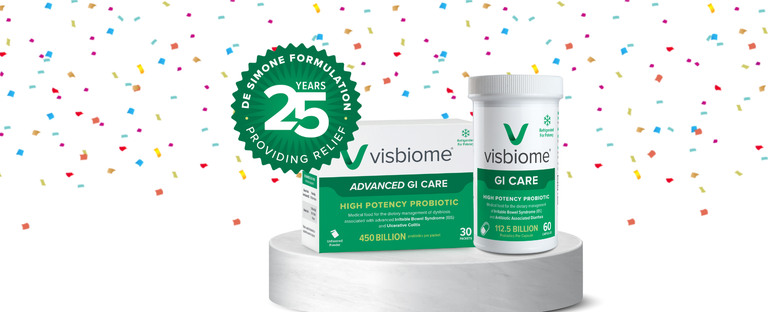In This Article
Share On
By: Jenna Sheldon, DO, MS

Pouchitis is an inflammatory condition that may occur in patients who have undergone an ileal pouch anal anastomosis (IPAA). The symptoms associated with pouchitis can be debilitating for patients and treatment options, especially for those who have symptoms resistant to antibiotics, are limited. The De Simone Formulation found only in Visbiome high potency probiotics, was recently named in the American Gastrointestinal Association (AGA) Clinical Practice Guidelines on Management of Inflammatory Pouch Disorders. These guidelines are developed from a multidisciplinary panel of experts utilizing the Grading of Recommendations Assessment, Development, and Evaluation (GRADE) system to analyze existing evidence and develop recommendations for the prevention and treatment of pouchitis.
Within their newly updated recommendations for prevention of pouchitis, the AGA guidelines “suggests using probiotics for preventing recurrent pouchitis”, specifically citing the De Simone Formulation as the multi-strain probiotic utilized in the clinical trials they reviewed to devise this recommendation. This recommendation is intended for patients with UC who have undergone IPAA and experience recurrent episodes of pouchitis. One of the studies referenced by the AGA includes utilizing antibiotics, ciprofloxacin, and rifaximin daily to achieve endoscopic remission prior to patients receiving the De Simone Formulation (Gionchetti et al., 2000). The guidelines also reference a similar study by Mimura et al. which utilized two different antibiotics, metronidazole and ciprofloxacin to achieve remission prior to randomizing patients to receiving the De Simone Formulation vs Placebo. The third study referenced, conducted by Pronio et al., examines the efficacy of the De Simone Formulation in post-surgery patients at various time periods who were not taking any medications before study entry. In summary, the AGA guidelines highlighted that this data supports utilizing the De Simone Formulation for preventing the recurrence of pouchitis in antibiotic-responsive patients, noting that the recommendation is conditional.
Probiotics are at the forefront of many clinical trials currently, with evidence surrounding their effectiveness in various disease states steadily increasing. The De Simone Formulation has been the subject of clinical trials involving nearly 500 adult and 47 pediatric patients. The makers of the De Simone Formulation, ExeGi Pharma, continue to prioritize research and development of microbiome science. The inclusion of the De Simone Formulation in the AGA Clinical Practice Guidelines on the management of Pouchitis and Inflammatory Pouch Disorders will hopefully highlight this high potency probiotic and its important indications for healthcare providers and patients looking to manage this condition.
References:
Gionchetti P, Rizzello F, Venturi A, Brigidi P, Matteuzzi D, Bazzocchi G, Poggioli G, Miglioli M, Campieri M. Oral bacteriotherapy as maintenance treatment in patients with chronic pouchitis: a double-blind, placebo-controlled trial. Gastroenterology. 2000 Aug;119(2):305-9. doi: 10.1053/gast.2000.9370. PMID: 10930365.
Mimura T, Rizzello F, Helwig U, Poggioli G, Schreiber S, Talbot IC, Nicholls RJ, Gionchetti P, Campieri M, Kamm MA. Once daily high dose probiotic therapy (VSL#3) for maintaining remission in recurrent or refractory pouchitis. Gut. 2004 Jan;53(1):108-14. doi: 10.1136/gut.53.1.108. PMID: 14684584; PMCID: PMC1773918.
Pronio A, Montesani C, Butteroni C, Vecchione S, Mumolo G, Vestri A, Vitolo D, Boirivant M. Probiotic administration in patients with ileal pouch-anal anastomosis for ulcerative colitis is associated with expansion of mucosal regulatory cells. Inflamm Bowel Dis. 2008 May;14(5):662-8. doi: 10.1002/ibd.20369. PMID: 18240282.


